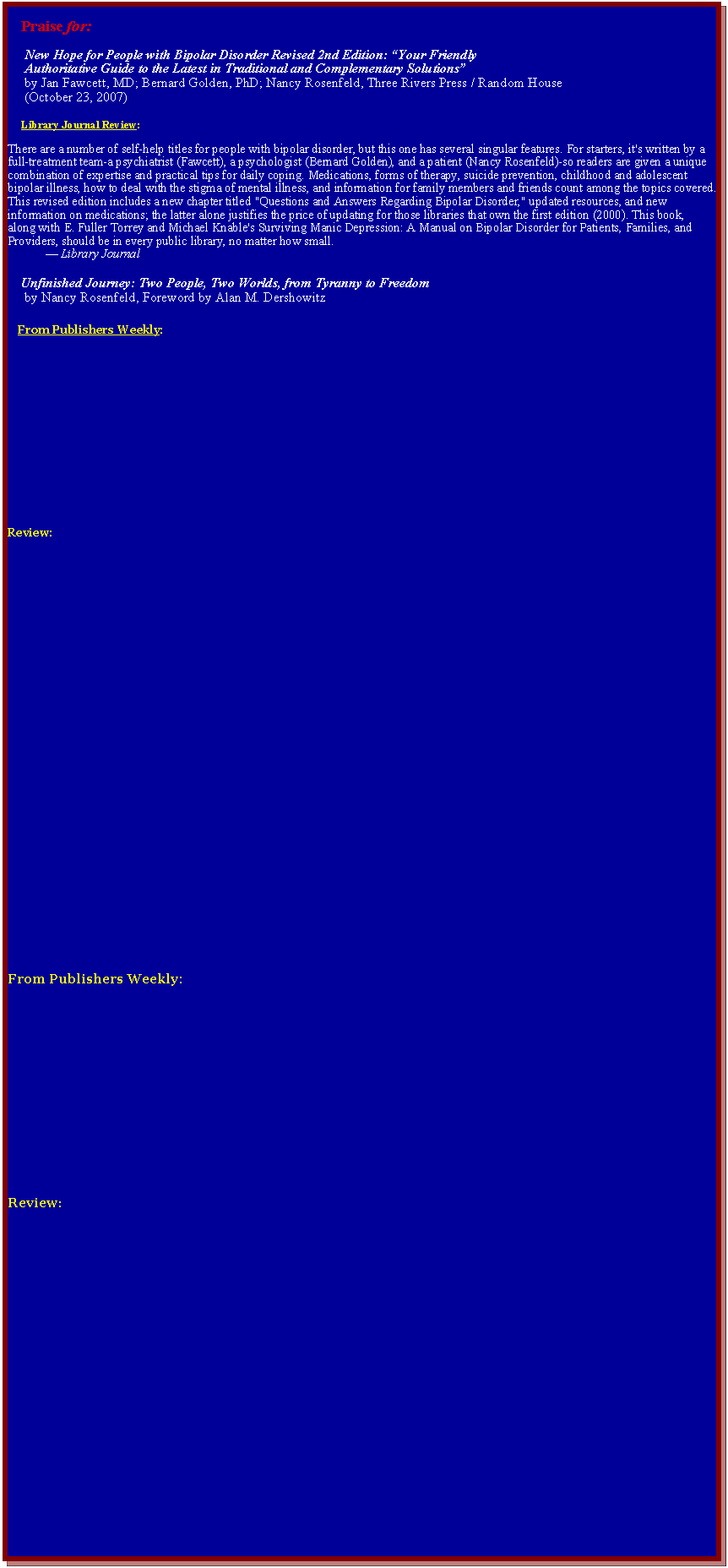|
AAA Home |
|
About Us |
|
Our Story |
|
Fiction List
|
|
Nonfiction List |
|
Award-winning Authors |
|
Highlighted Events |
|
Publishing News |
|
Submit Your Work |
|
Contact Us! |


|
Accolades and Reviews |
|
Praise for: Foreword, by Paul Simon, Former U.S. Senator (D-IL)
The world has changed dramatically in the years since Yuri Tarnopolsky came into my life and the lives of those who fought for Soviet refuseniks. I was privileged to have worked with the fine volunteers of Chicago Action for Soviet Jewry, who launched the rescue effort for Yuri. The magnitude of that effort was staggering. No less staggering was the sacrifice Yuri and other dissidents made for the cause of freedom.
Memoirs of 1984 does what George Orwell’s visionary warning to future generations would not. It paints a poignant picture of human survival in an inhuman totalitarian system; it is a graphic portrait of real people in an unreal world. Yuri’s moving snapshots of life in the Gulag and his incisive critiques of the forces of socialism, ideology, modern Judaism, and Russian history are more than memoirs for posterity. Memoirs of 1984 is a living testament to the power and force of freedom and a tribute to those, who by their very sacrifice and dedication to human values, perpetuate the ideals of freedom and democracy throughout the world.
Yuri’s words are words of inspiration and not words of warning for future generations. His anecdotes are a celebration of humanity rather than an indictment of it. His message of human survival in a totalitarian society is as relevant today as sit was just a few years ago, because totalitarians remain with us today and, I fear, always will.
Ultimately, this book is about tolerance: tolerance of political diversity, of religious differences, of races and cultures that are dissimilar to our own. We can all learn from Yuri Tarnopolsky. — Senator Paul Simon
|
|
A Ukrainian-born Jewish chemist, Tarnopolsky became an activist after his request to emigrate was refused; he spent three years in a Soviet labor camp before being allowed to come to the U. S. in 1987. His meandering "collection of reminiscences," written in simple, direct English, tells a worthy story about dissidence and the sickness of Soviet society but doesn't offer much new to a growing literature. Born in 1936, the author traces his skepticism of the Soviet system to Khrushchev's de-Stalinization speech of 1956, the Soviet invasion of Czechoslovakia in 1968 and his surveillance by the KGB beginning in 1976. Most interesting is Tarnopolosky's invocation of his scientific training: facing the insanities of interrogation, he sees his responses as a "little experiment"; he finally embraces Judaism through rationalism. He offers some intriguing intellectual history: 19th-century Russian dissident Alexander Herzen inspired his critical attitude toward society. Life in a labor camp, the author notes mordantly, is "a natural continuation of Soviet life." Nancy Rosenfeld, whose book Unfinished Journey (Paperback Forecasts, Sept. 20) also concerns Tarnopolsky's path to emigration, contributes an afterword. |
|
Here is the struggle of a man who was ready to change single-handedly the policies and rules of the Soviet Union and who was ready to suffer the consequences in the universal struggle for freedom and human rights. -- Zafra Lerman, Columbia College, Chicago
His moving and highly personal story recounts in vivid and touching detail his struggle to maintain his dignity and to physically survive even under atrocious conditions of punishment....A must on any reading list. ― The New York Times Book Review
Vivid, eccentric, often gripping narrative...fascinating insights into Soviet society, and into Russian history and character...written in a remarkably effortless style, especially considering that English is not the writer's first language. -- Joseph L. Birman, City College of New York |
|
Despite its sometimes clumsy, sometimes hyperbolic prose, this book tells a most important story: how Rosenfeld, an upper-middle-class, suburban Chicago housewife turned fervent activist, spearheaded a five-year, grassroots campaign (1982-86) to gain freedom for the Ukrainian-Jewish scientist and poet Yuri Tarnopolsky. Tarnopolsky had been imprisoned on trumped-up charges and denied permission to emigrate for years. Rosenfeld and other volunteers at the Chicago Action for Soviet Jewry applied the political equivalent of a "full court press"--using letter-writing campaigns and lobbying in coordination with similar efforts throughout the U.S. and in France--generating so much international attention that the cost of retaining Tarnopolsky finally came to exceed that of allowing him to leave. Rosenfeld also writes movingly of the price her husband and two sons paid for her "compulsory activism," and of her disorientation and depression when this activism waned after Tarnopolsky was freed. Rosenfeld makes a significant contribution to our understanding of how grassroots American Jewish activism on behalf of Soviet Jewry helped "open the iron door" of the U.S.S.R. Photos not seen by PW. Copyright 1993 Reed Business Information, Inc. |
|
...this book tells a most important story. Rosenfeld makes a significant contribution to our understanding of how grassroots American Jewish activism on behalf of Soviet Jewry helped 'open the iron door' of the U.S.S.R. ― Publishers Weekly
...this book tells a most important story. Rosenfeld makes a significant contribution to our understanding of how grassroots American Jewish activism on behalf of Soviet Jewry helped 'open the iron door' of the U.S.S.R. ― Publishers Weekly |
|
Accolades & Reviews |